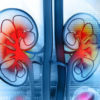Hormonal Imbalance Treatment in Northern New Jersey
 When hormones are balanced, the body functions efficiently and individuals have enough physical energy, as well as the ability to rest. It is normal for hormone production to fluctuate and change, especially as people age. But when hormonal imbalance occurs for extended periods, different parts of the body and their functions may be affected. A hormonal imbalance refers to the presence of too much or too little of one or more hormones.
When hormones are balanced, the body functions efficiently and individuals have enough physical energy, as well as the ability to rest. It is normal for hormone production to fluctuate and change, especially as people age. But when hormonal imbalance occurs for extended periods, different parts of the body and their functions may be affected. A hormonal imbalance refers to the presence of too much or too little of one or more hormones.
At Bergen Medical Associates, the endocrinology department offers hormonal imbalance treatments to patients throughout northern New Jersey.
What Is Hormonal Imbalance?
Hormones are chemical messengers produced and secreted by the endocrine glands that move throughout the bloodstream. They are powerful and impact the way the tissues, muscles, and organs function. Processes in which hormones are involved include:
- Growing and developing, from pregnancy to death
- Governing metabolism, or how the body processes food for energy
- Influencing sexual and reproductive functions
- Impacting mood and energy levels
- Controlling sleep cycles
- Regulating blood sugar and blood pressure
There are many types of hormones, all created within the endocrine system. The term hormonal imbalance encompasses a variety of conditions. Experienced endocrinology practitioners at Bergen Medical Associates can help determine whether a hormonal imbalance is present and prescribe appropriate hormonal imbalance treatments.
What Are the Signs and Symptoms of Hormonal Imbalance?
The body produces many different types of hormones, so there are lots of signs and symptoms that may point to a hormonal imbalance. These include:
- Slow or rapid heartbeat
- Fatigue and sleep disruption
- Diarrhea, constipation, or frequent bowel movements
- High cholesterol levels
- Increased thirst and urination
- Unexplained weight gain or loss
- Numbness and tingling in the hands
- Depression, anxiety, and other mood disorders
- Skin tags, and darkened skin in some areas of the body
- Irregularly distributed body fat, including a hump between the shoulders
- Aches, pains, stiffness, and tenderness in joints and muscles
- Decreased sex drive
- Dry or swollen skin on the face
- Thinning hair or excessive hair growth
- Blurred vision
- Persistent acne
Because hormones are so important for reproduction, there are also signs and symptoms of hormonal imbalance related specifically to the sex assigned to a person at birth, male or female. These types of symptoms may include:
- Heavy or irregular periods during menstruation
- Hot flashes
- Infertility
- Vaginal atrophy and dryness
- Erectile dysfunction
- Enlarged breast tissue in males
With so many reported signs and symptoms of hormonal imbalance, consulting with a medical professional is the best course of action. Patients who have concerns about these or other symptoms can make an appointment at any of the convenient Bergen Medical Associates office locations throughout northern New Jersey.
What Are the Risk Factors for Hormonal Imbalance?
There are many different types of hormonal imbalances, with a variety of possible causes, including eating disorders and poor diets, cancer treatments, tumors, stress, misuse of anabolic steroid medications, exposure to toxins, and traumatic injuries. Some medical conditions may increase the risk of experiencing chronic hormonal imbalance, including diabetes, Cushing’s syndrome, iodine deficiency, hyperthyroidism, and hypothyroidism.
How Is Hormonal Imbalance Diagnosed at Bergen Medical Associates?
The endocrine specialists at Bergen Medical Associates will first review a patient’s medical history and perform a physical evaluation. If hormone imbalance is suspected, they will request blood tests to check hormone levels. Depending on the findings, there may be additional blood tests to track these levels throughout the day. Other tests that may be required for diagnosing hormonal imbalance include:
- Imaging, such as ultrasound, X-ray, or MRI
- A scan of the thyroid gland, which is a gland in the neck
- Biopsy
- Urine tests
- Sperm count test
What Are Recommended Options for Hormonal Imbalance Treatment?
Once the cause of the condition has been diagnosed, medical practitioners at Bergen Medical Associates can offer appropriate hormone imbalance treatments. These may include:
- Oral medications, including hormonal therapies
- Injections
- Surgery
- Radiation therapy
- Treatments for diabetes
- Levothyroxine to treat hypothyroidism
Consult With Endocrinologists at Bergen Medical Associates
When a patient’s body shows signs of hormonal imbalance, they should consult with a qualified medical practitioner about the condition. Offering a variety of medical specialties, the board-certified physicians, nurses, and well-trained staff at Bergen Medical Associates provide comprehensive care for patients in office locations throughout northern New Jersey. For more information, contact us today.










